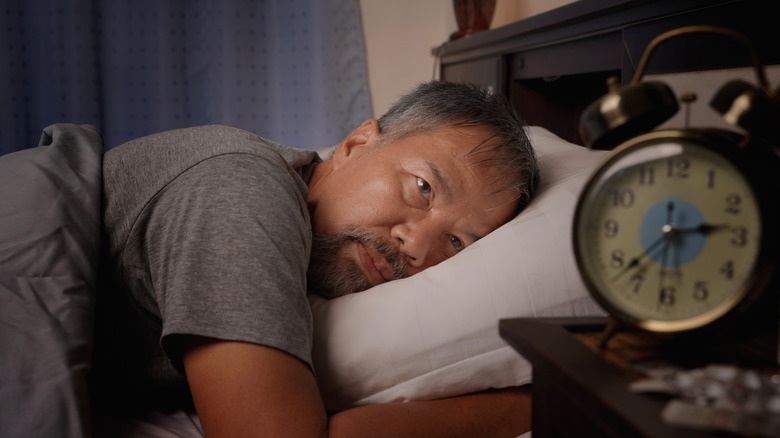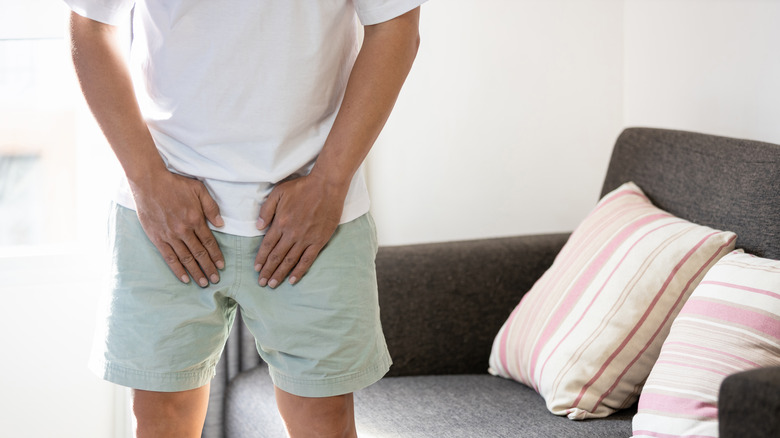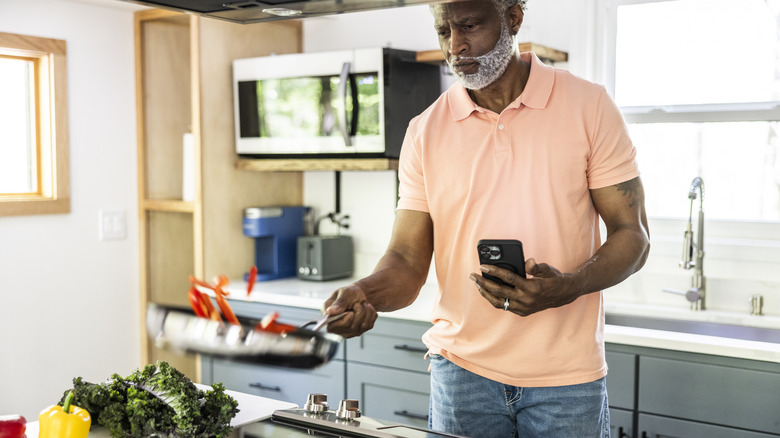Waking Up To Pee This Many Times Could Be A Warning Sign For Your Prostate
Nobody enjoys waking up to pee in the middle of the night when you're meant to be getting undisturbed 7-9 hours of sleep. Not only are you stumbling, half awake, in the bathroom trying to get your business done in one piece, but you might end up waking up feeling less refreshed because your sleep was broken.
If your nighttime urination happens two or more times a night, also referred to as nocturia, you might be dealing with an enlarged prostate. An enlarged prostate, otherwise known as benign prostatic hyperplasia (BPH), is a health condition that affects more than half of men by the time they turn 60 and almost 90% of men who reach age 85, per UCI Health urologist Dr. Faysal A. Yafi. "The prostate, normally about the size of a walnut, lies between the bladder and the urethra. As new tissue grows — a natural phenomenon in men as they age — it blocks some of the flow of urine through the urethra," explained the expert. A bigger prostate gland also exerts pressure on the bladder, leading to frequent urination during the day and, unfortunately, at night as well. Even though this prostate growth is typically considered benign, the symptoms can affect a man's quality of life, particularly if they are keeping them up at night.
Unsurprisingly, the signs of an enlarged prostate don't stop with frequent nighttime urination.
The other warning signs related to an enlarged prostate
Urine dribble at the end of peeing, inability to urinate, incontinence, feeling like you can't empty your bladder fully, painful urination, bloody pee, straining to pee, weak urine stream, difficulty with starting urination, and bladder fullness are some other symptoms that come with BPH.
Waking up to pee more than two times in the night is often one of the first signs men may notice, per experts, mainly because it's easier to notice how many times you're urinating at night when you're supposed to be sleeping than it is during the day when going to the bathroom frequently can be less prominent.
Disturbed sleep can lead to other problems like irritability, fatigue, and difficulty concentrating. Interrupted sleep is associated with mental health disorders, immunity issues, obesity, hormone imbalances, and heart disease too. For men with an enlarged prostate, already dealing with urinary problems, this can often further affect their quality of life. This is why it's important to keep an eye out for nocturia and deal with the underlying health concern that's causing it. Speaking of health concerns, it is important to note that an enlarged prostate is not the only thing that may lead to nocturia. High blood pressure, diabetes, heart disease, obstructive sleep apnea, and pelvic organ prolapse can be causes too. Coming back to an enlarged prostate, however, there are some health-professional-recommended tips for how you can combat waking up at night to pee.
How to handle nighttime urination related to BPH
Now that you've zeroed in on one of the things you didn't realize was ruining your sleep at night, you may want to try incorporating some of the natural remedies related to prostate health as you age.
Experts advise limiting your fluid intake, especially two to three hours before bedtime. Alcohol and caffeine, by nature (being that they're diuretics), can also make matters worse. While having a cup of coffee in the morning is okay, avoid drinking caffeinated beverages or alcohol too close to bedtime. Smoking can irritate your bladder too, so if you're a smoker, you may want to think about quitting or cutting back.
Looking at other lifestyle changes, like eating a balanced diet with sufficient fiber, could also help. Constipation could cause nighttime urination; for men with an enlarged prostate, it can mean added pressure on the bladder. There are also exercises men can do to relieve prostate symptoms, like kegels and yoga. Strengthening the muscles around your bladder and your pelvic floor could help with the problem of frequent urination.
While lifestyle modifications can work for mild symptoms of BPH, doctors may recommend medications like muscle relaxants and diuretics if such changes aren't cutting it. While relaxing your muscles can help with freer urine flow, taking diuretics early in the day could help you empty your bladder fully before sleep. That being said, BPH warning signs can be severe, leading to bladder infections and kidney stones. Prostate-shrinking medications and other surgical remedies can be considered as well.


